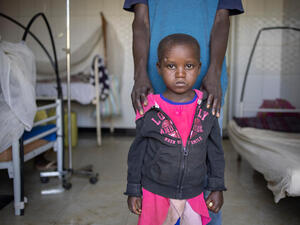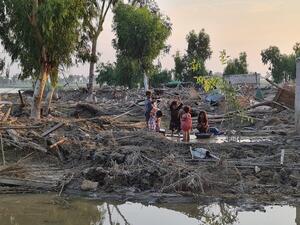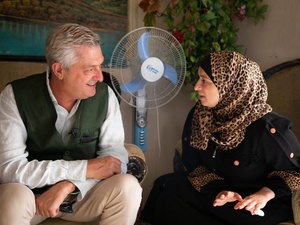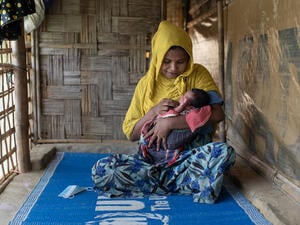Meet the Syrian cartoonist behind UNHCR's first-ever NFT fundraiser
Meet the Syrian cartoonist behind UNHCR's first-ever NFT fundraiser

One of seven illustrations by Syrian cartoonist Hani Abbas included in UNHCR's first-ever NFT fundraising sale.
Syrian-Palestinian cartoonist Hani Abbas, 44, was born and grew up in Yarmouk, a Palestinian refugee camp in the southern suburbs of the Syrian capital Damascus. From the late 1990s his cartoons appeared in publications and exhibitions in Syria and across the Middle East, before he and his family fled the conflict in 2012 and eventually settled in Switzerland as refugees.
Since then, Abbas’s work – which tackles themes of injustice, loss, and the human cost of conflict – has featured in publications including Le Temps and La Liberté in Switzerland and France’s Le Monde. He is also a member of the Cartooning for Peace organization, a network of press cartoonists committed to promoting freedom and democracy. In 2014, Abbas received the International Editorial Cartoon Prize in Geneva.
To mark the 70th anniversary of UNHCR, the UN Refugee Agency, Abbas has teamed up with national partner association Switzerland for UNHCR to launch the agency’s first-ever NFT (non-fungible token) fundraising sale. Abbas has created seven cartoons, from which ten copies of each will be converted into unique digital assets and sold as NFTs on the OpenSea online marketplace to raise funds for UNHCR’s Afghanistan crisis response.
Ahead of the start of the sale on 4 November, UNHCR spoke with Abbas and asked him about his life in Syria, his experiences as a refugee, and the meaning behind the images he has created. The conversation has been edited for length and clarity.
What was your early life like growing up in Yarmouk camp?
Yarmouk is called a camp, but it’s really a part of the city with buildings, streets, and all the normal services. Growing up there was something nice and something hard. A lot of people in a small area; many pupils in the school. We had a beautiful, funny life – hard, but beautiful. Sometimes hard memories become nice when you look back. When I remember it now, I have nostalgia about that time. I remember my friends, my neighbourhood, my street, my family home.

Syrian-Palestinian cartoonist Hani Abbas in Geneva, Switzerland.
When did you first show a talent for drawing?
When I was a child, I loved to draw. I drew everything, and I drew on everything – I was drawing on the walls, in school textbooks, on my body - everywhere. This is a child’s job! I loved drawing and when I was in school, my art teacher supported me and entered my work in a UN children’s drawing prize which I won twice, when I was 13 and 14. Those prizes gave me the power and the belief to continue drawing – I felt like I had something to say through my drawing. You can explain your story, your feelings, your ideas.
Did you always want to be a cartoonist?
No. At first it was anything, but when I was around 18, I started thinking about cartoons because I saw a lot in the newspapers, and on the walls of the camp. The walls were like our newspaper in the camp. Yarmouk was one big newspaper. In 1998 I published my first cartoon in a Palestinian magazine, then had exhibitions in the camp, in Damascus, Aleppo and Lebanon. I started connecting with newspapers – that’s how it goes. At the same time, I was also a teacher in an elementary school in Damascus.
What themes do you address in your cartoons?
My early cartoons were about Palestine, Palestinian refugees in the Middle East. More political than funny because it was difficult for me to draw something funny. I always go towards tragedy and darkness because I draw what I’m feeling. I’m trying to explain about myself and my people. At that time, I was just drawing and there was no problem for me, but when the conflict started, you had to take your life in your hands when you drew.
I’m still drawing now. Drawing in a safe place like Switzerland is good, you have total freedom. But you lose the sense of danger, the challenge. For me I did my best drawings under the bombs. I lost a big part of my power when I left Syria, but I still have the power of memory.
"The memories occupy my mind all the time."
How did the conflict affect you personally?
I moved many times in Syria starting from March 2011 until December 2012 when I left. The last six months were very difficult to live under the bombs all the time. At that time, we would hear three sounds. The first was the sound of the shell when it was launched. The second was the sound of the shell above us in the sky. The third sound was the sound the of the explosion on the ground, or in a building. I was drawing all the time, but when I heard that first sound, I would lift my pencil and wait, thinking: ‘maybe this is my last drawing’. If I heard the third sound, that meant I was still alive. I’m lucky because I always heard all three sounds, but many thousands of Syrian people around me never heard the third sound.
You managed to escape Syria, first to Lebanon and then Switzerland. How did your life change?
Before, my family was all in the same place, now everyone is spread around the world. I’m here in Switzerland, in Geneva, my brother is in Cologne in Germany, my parents and two other brothers are in Sweden, and another brother is in Madrid, in Spain. It’s not easy to connect with them. It’s good we have social media and video calls, but it’s not the same. My kids are speaking French now, my brother’s kids are speaking German, Swedish, another Spanish. When they meet now it’s not easy to connect with so many languages, different cultures, different educations. We will lose our family tree. The branches have been cut off and are drifting down the river in different directions. But Switzerland is very good for my kids, without any problems and without any bad memories, without any dangers in the future. For me, it’s okay. I’m working here, I’m still drawing, I’m feeling good – life is good – but the memories occupy my mind all the time.
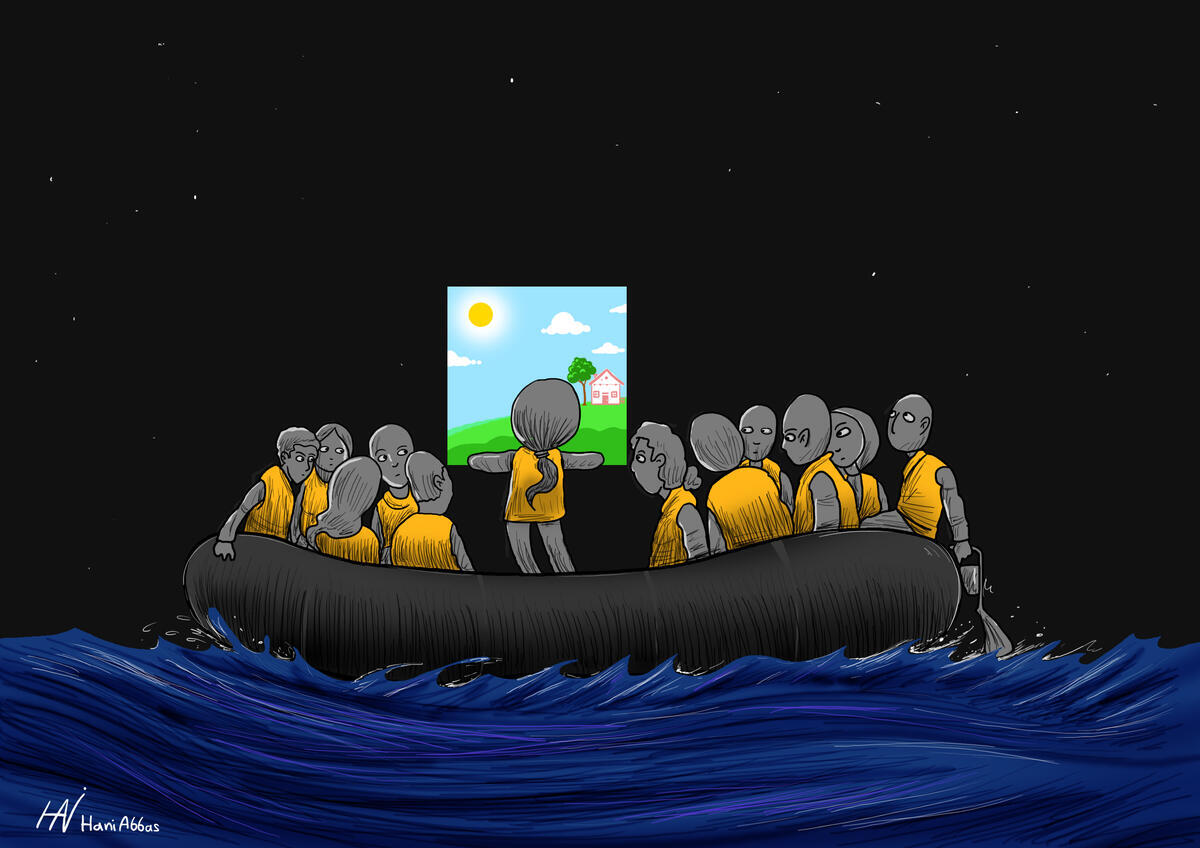
Another of the seven images from a series entitled 'Windows', which examine memory and loss.
The images you’ve created for the NFT sale are part of a series you call “Windows”. What significance do windows have in your work?
What is the meaning of windows in my heart? They are our windows to see the country, to see people – to connect with them and hear them. In 2011, after four months of the conflict I drew the first window – a destroyed building with just a window still standing, and a young man waiting outside with a flower to see his love, who was gone. It represents what we’ve lost. I’ve drawn other figures who have left everything else behind but take a window with them, because the window is their memory. I have my own ideas and feelings about the images, but I hope everyone who looks at them can see the effect of war on people.
"I hope all the people who have problems in their countries can get out."
The money raised in the sale will be used to support the people of Afghanistan. How did you feel watching recent events there?
It felt familiar for me because we were – we’re still – like them. The same problems, the same feelings, the same stories. In the news we always heard about the politics, but we didn’t know what was happening to normal people. For me, I hope all the people who have problems in their countries can get out. I support people who want to get out if they have dreams, if they want to protect their kids.
You’re used to publishing your cartoons in newspapers. How do you feel about them being turned into unique digital assets and sold as NFTs instead?
I don’t have any experience of this – I just do the drawings! But every cartoonist wants their work to be seen, and I support these new ideas. Anything that will help people and explain the hard conditions and problems they face, and allow other people to support them. It’s a new idea, and when I heard about it, I loved it. We hope now it succeeds in focusing attention on the problems of [Afghans], and makes money for them of course, because they need it. Sometimes, to make a little bit of change in people’s lives they just need a tent or a little bit of food, a bit of support or a little education.
To see all the images included in the sale, please click here.



